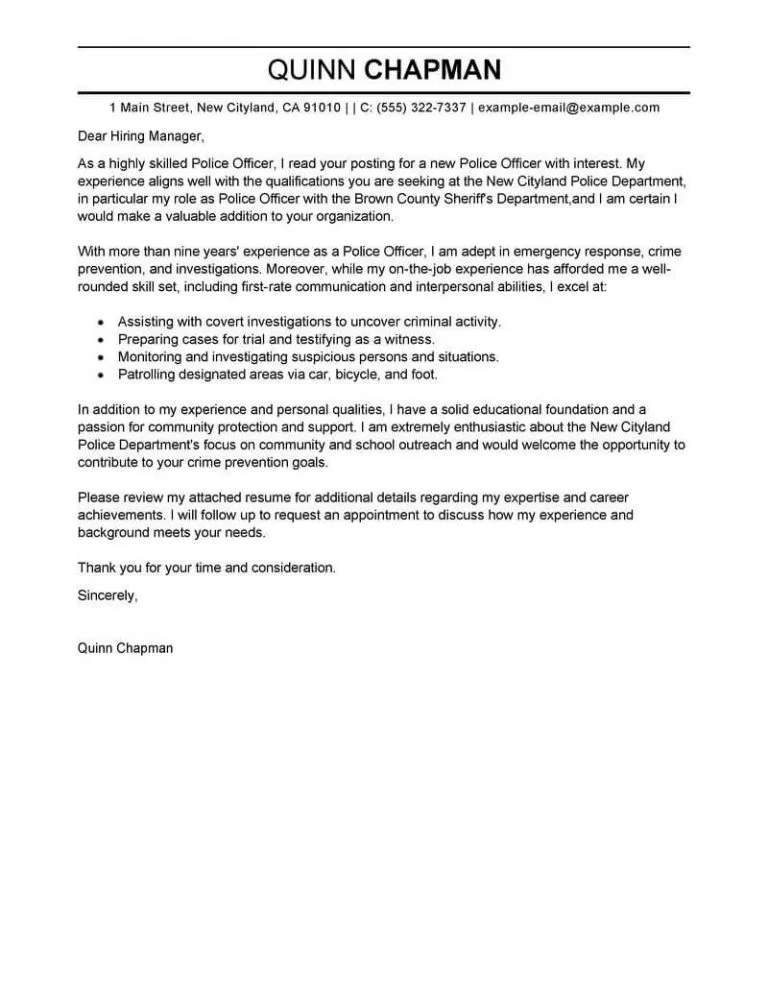Why a Cover Letter Matters in Law Enforcement
In the competitive field of law enforcement, a compelling cover letter can be the key to unlocking your dream job. Unlike a resume, which provides a snapshot of your qualifications, a cover letter gives you the opportunity to tell your story, demonstrate your passion, and connect with the hiring manager on a personal level. It’s your chance to go beyond the facts and showcase your unique personality, values, and aspirations. A well-crafted cover letter sets you apart from the crowd, highlighting your genuine interest in the specific department and demonstrating that you’ve taken the time to understand their mission and values. In an industry where attention to detail and communication skills are paramount, a polished cover letter immediately signals your professionalism and suitability for the role. Neglecting this crucial element could mean missing out on opportunities, as many hiring managers view a cover letter as a non-negotiable requirement.
Highlighting Relevant Skills and Experience
Your cover letter is the perfect platform to spotlight the skills and experiences that directly align with the demands of law enforcement. Start by carefully reviewing the job description and pinpointing the key requirements, such as communication, problem-solving, teamwork, and physical fitness. Then, draw on your past experiences to illustrate how you’ve successfully demonstrated these qualities. Focus on providing concrete examples that showcase your abilities, using the STAR method (Situation, Task, Action, Result) to structure your narratives. This will help the hiring manager visualize your capabilities and understand the value you bring. Quantify your achievements whenever possible; for instance, instead of saying “Improved team efficiency,” state “Increased team efficiency by 15% through implementing new strategies.” This approach provides tangible evidence of your impact and strengthens your application. Remember to tailor your examples to the specific requirements of the position you are applying for.
Law Enforcement Experience
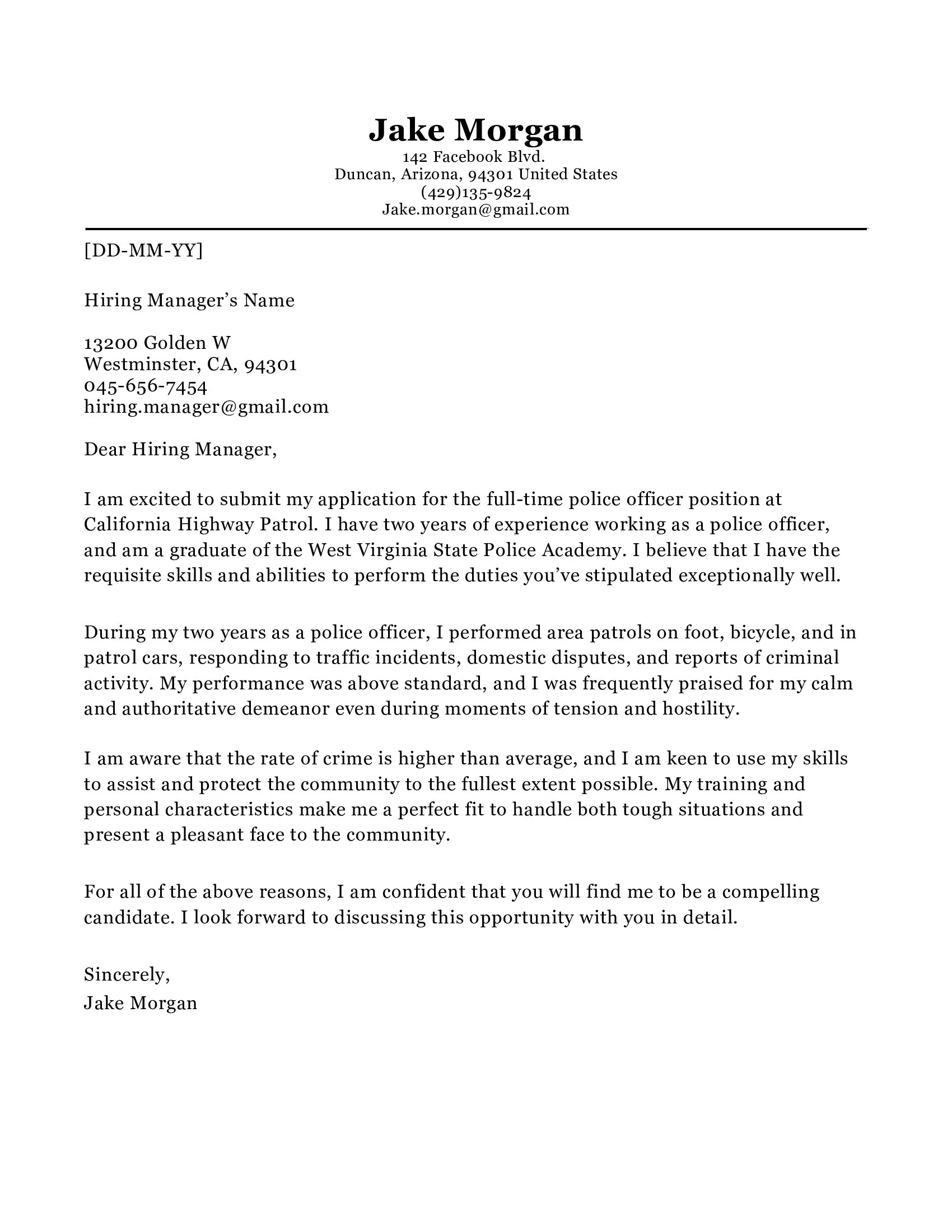
If you possess prior law enforcement experience, make sure to highlight these roles prominently in your cover letter. Detail the specific responsibilities you held, the types of cases you handled, and the challenges you overcame. Emphasize your accomplishments, such as successful investigations, arrests made, or community outreach initiatives. Even seemingly minor experiences can be valuable, so don’t hesitate to showcase your contributions to team efforts and your ability to work under pressure. When describing your experience, use action verbs like ’led,’ ‘managed,’ ‘investigated,’ ‘patrolled,’ and ’enforced’ to create a vivid picture of your capabilities. If you’ve received any commendations or awards, be sure to mention them as they demonstrate your dedication and professionalism. Provide specific examples of how your past experience aligns with the current job requirements, demonstrating a clear understanding of what the department is looking for.
Relevant Skills
Beyond your experience, a successful law enforcement career demands a specific skill set. In your cover letter, highlight the skills you possess that are most relevant to the position. This includes communication skills, both written and verbal. Law enforcement officers must be able to write clear and concise reports and communicate effectively with a wide range of individuals. Another important skill is critical thinking and problem-solving. Officers must be able to assess situations quickly, make sound judgments, and take appropriate action. Teamwork is crucial in law enforcement. Highlight your ability to collaborate with others and work effectively as part of a team. Physical fitness and self-defense skills are also essential. If you have relevant certifications or training, be sure to mention them. Don’t forget skills like de-escalation techniques, conflict resolution, and cultural sensitivity, all of which are critical for effective policing. Provide specific examples of how you’ve utilized these skills in the past, demonstrating your ability to apply them in real-world scenarios.
Tailoring Your Cover Letter
One of the biggest mistakes job seekers make is submitting generic cover letters. To truly stand out, you need to tailor your cover letter to each specific job application. This involves customizing your letter to address the specific requirements of the position and demonstrating your understanding of the department’s values and mission. Start by thoroughly reviewing the job description, paying close attention to the desired qualifications and skills. Then, use these keywords and phrases throughout your letter. Next, research the law enforcement agency you are applying to. Learn about their specific goals, initiatives, and recent accomplishments. Mention these aspects in your letter to show that you’ve taken the time to understand the department. Tailoring your cover letter also means modifying your examples to directly reflect the requirements of the specific role. If the job description emphasizes community engagement, highlight any relevant volunteer work or community outreach you’ve done. Always emphasize how your skills and experiences align with the department’s needs and values.
Researching the Department
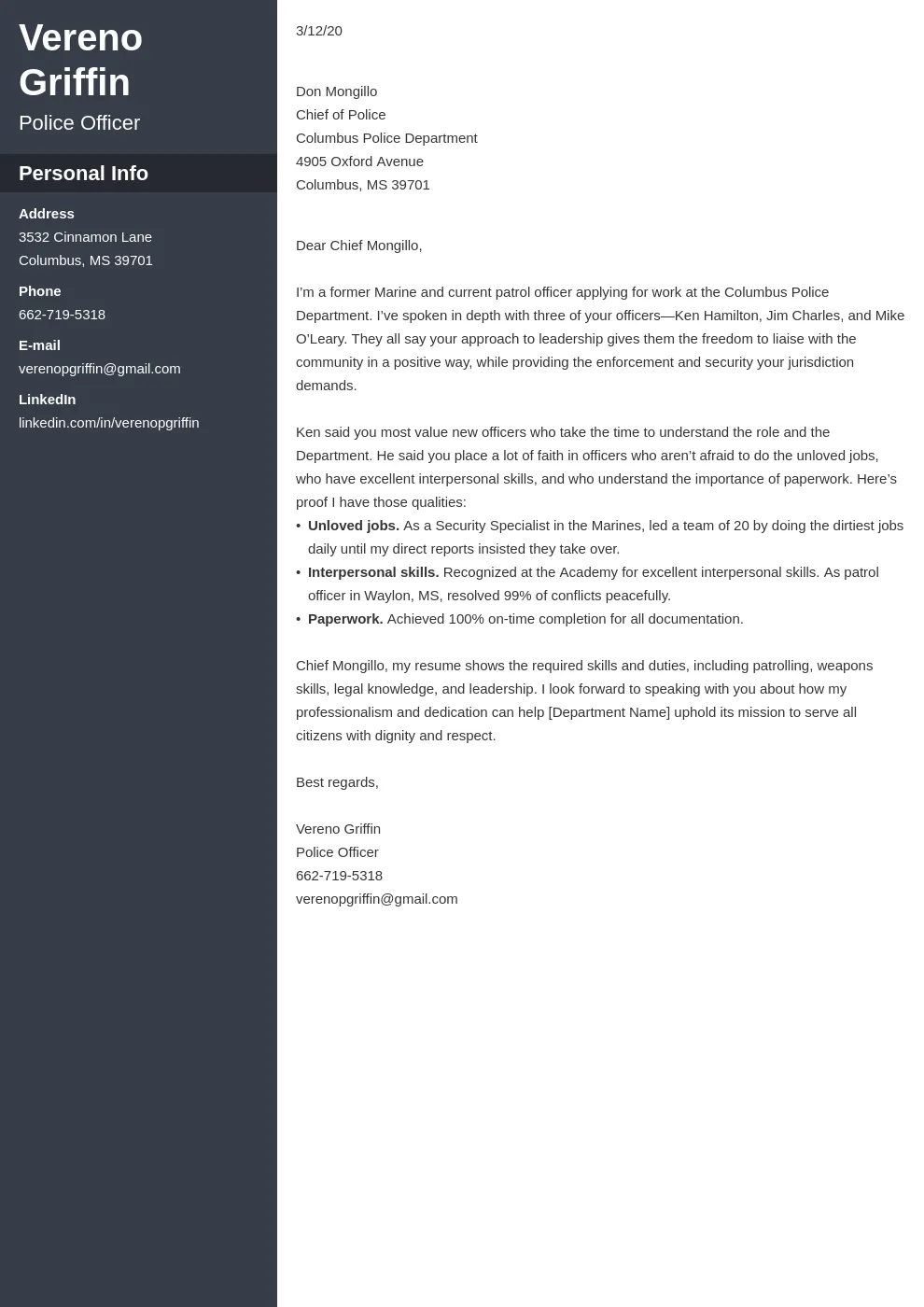
Before writing your cover letter, dedicate time to researching the law enforcement department you are applying to. This research will enable you to tailor your letter, demonstrate your genuine interest, and showcase that you are a good fit for their organization. Visit the department’s website, read about their mission, values, and community initiatives. Look for recent news articles or press releases that highlight their accomplishments and priorities. Examine their social media presence to get a sense of their culture and values. If possible, try to speak with current or former officers to gain insights into the department’s operations and culture. The information you gather will provide you with valuable insights that you can incorporate into your cover letter. Mention specific aspects of the department that resonate with you, demonstrating that you’ve taken the time to understand their mission. This shows the hiring manager that you are genuinely interested in joining their team, not just applying for any job.
Showcasing Your Personality and Passion
Law enforcement agencies seek candidates who are not only qualified but also possess the right personality and a genuine passion for the job. Your cover letter is the perfect opportunity to showcase these qualities. While professionalism is paramount, don’t be afraid to let your personality shine through. Share your enthusiasm for law enforcement and why you are drawn to this career path. This can be done by mentioning specific aspects of the job that excite you or detailing your long-term career goals. Highlight any personal experiences or motivations that have shaped your desire to serve and protect the community. Express your commitment to upholding justice, serving others, and making a positive impact. Illustrate your values, such as integrity, respect, and compassion. Provide examples of how you embody these values in your personal and professional life. By infusing your cover letter with personality and passion, you’ll create a memorable impression and demonstrate that you are more than just a qualified applicant. You’ll show that you are the kind of person who will go above and beyond to serve and protect.
Using Action Verbs and Quantifiable Achievements
To make your cover letter impactful, it’s crucial to use strong action verbs and quantify your achievements whenever possible. Action verbs bring your experience to life and demonstrate your capabilities. Instead of saying ‘responsible for,’ use verbs like ‘managed,’ ’led,’ ‘investigated,’ ‘implemented,’ or ‘resolved.’ This creates a more dynamic and compelling narrative. Quantifying your achievements provides concrete evidence of your impact and adds credibility to your claims. For instance, instead of saying ‘Improved team performance,’ write ‘Increased team performance by 15% through implementing a new training program.’ Instead of saying ‘Handled numerous cases,’ state ‘Successfully closed over 50 cases within a year.’ By using numbers and specific examples, you provide tangible proof of your abilities and differentiate yourself from other applicants. Use the STAR method (Situation, Task, Action, Result) to structure your examples and showcase your achievements in a clear and concise manner. This approach will make your cover letter more persuasive and memorable, increasing your chances of landing an interview.
Formatting and Structure for Impact
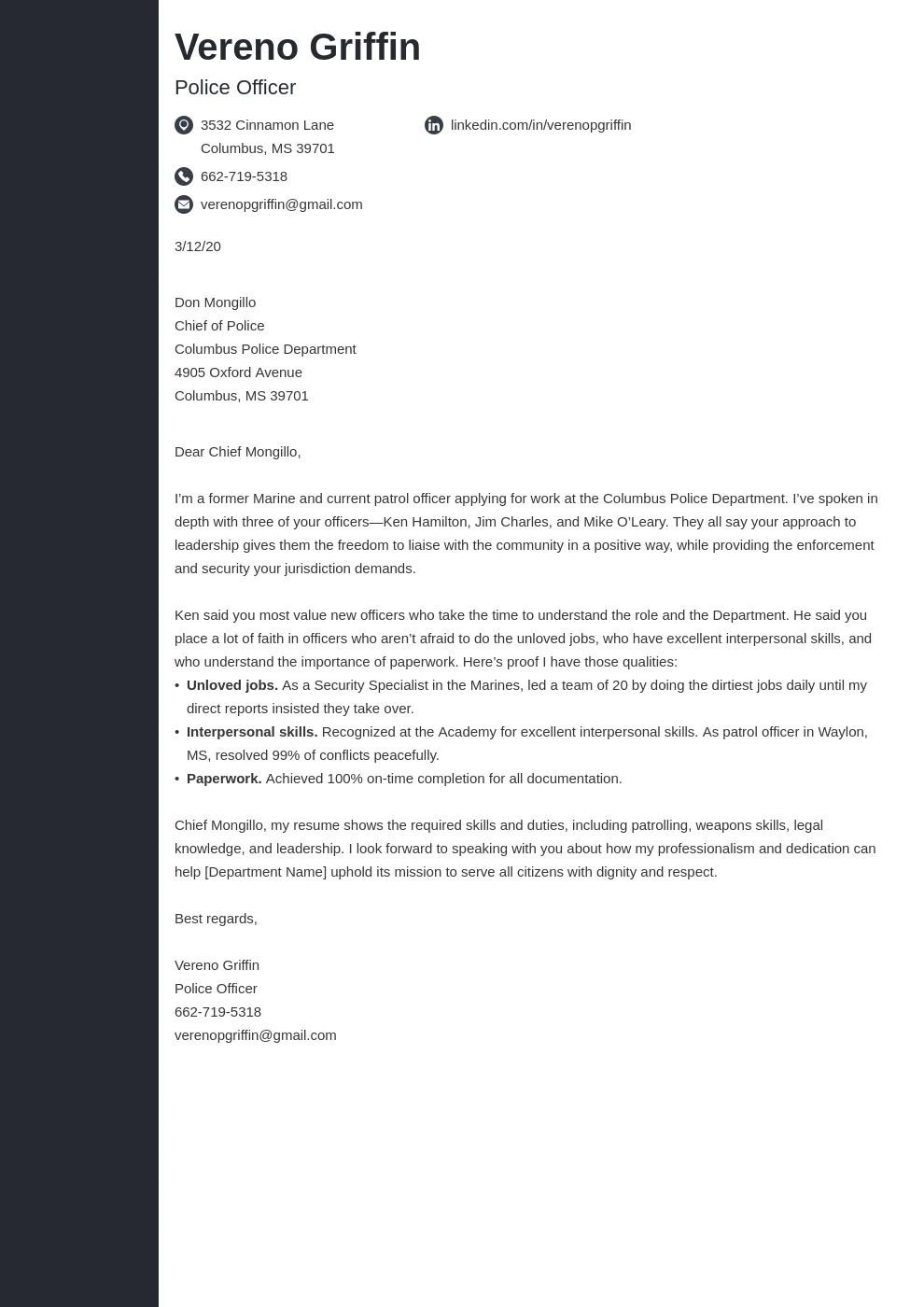
A well-formatted cover letter is essential for making a positive first impression. Ensure your letter is easy to read and visually appealing. Choose a professional font, such as Times New Roman or Arial, and use a font size of 11 or 12 points. Keep the margins at one inch on all sides. Use clear and concise language, avoiding overly complex sentences and jargon. Break up large blocks of text with short paragraphs and bullet points to improve readability. Structure your cover letter with a clear header containing your contact information, the date, and the hiring manager’s name and contact information. Include a compelling opening paragraph that grabs the reader’s attention and states your purpose. The body paragraphs should highlight your qualifications and experiences, focusing on your most relevant skills and achievements. End with a strong closing paragraph that reiterates your interest in the position and expresses your gratitude for their consideration. Proofread your cover letter carefully to eliminate any typos or grammatical errors. A well-formatted and error-free cover letter demonstrates professionalism and attention to detail, both of which are crucial in law enforcement.
Header and Contact Information
The header of your cover letter is the first thing a hiring manager will see, so make sure it is professional and contains all the necessary information. Begin by listing your full name, address, phone number, and email address. Ensure your email address is professional-sounding and not something casual. Next, include the date and the hiring manager’s name, title, and the department’s address. If you don’t know the hiring manager’s name, try to find it by checking the department’s website or calling the human resources department. If you are unable to find it, you can use a general salutation like ‘Dear Hiring Manager.’ Using the correct name shows you’ve taken the time to research the department. Make sure all your contact information is accurate and up-to-date, so the hiring manager can easily reach you. The header sets the tone for your entire cover letter, so make it neat, organized, and professional.
Opening Paragraph
The opening paragraph is your opportunity to capture the hiring manager’s attention and make a strong first impression. Start by stating the position you are applying for and how you learned about the opportunity. Briefly mention why you are interested in the role and what makes you a good fit. Highlight one or two key qualifications or achievements that directly align with the job requirements. Show enthusiasm and excitement about the opportunity. You can also briefly mention your knowledge of the department and their mission. Avoid generic opening lines. Instead, tailor your opening to the specific job and department, making it clear that you understand their needs and values. A compelling opening paragraph sets the stage for the rest of your cover letter, drawing the reader in and encouraging them to learn more about your qualifications and aspirations.
Body Paragraphs
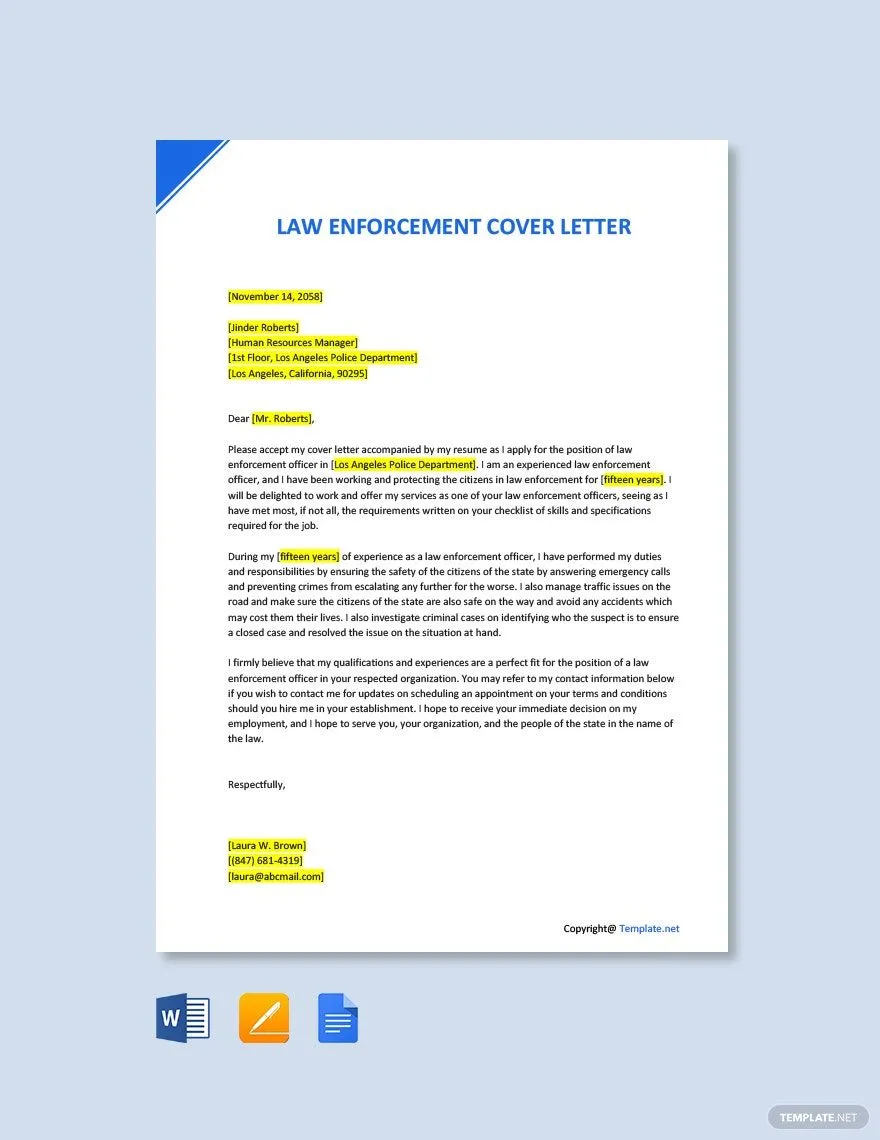
The body paragraphs are where you elaborate on your qualifications, skills, and experience, providing specific examples to support your claims. Each paragraph should focus on a specific aspect of your background or the job requirements. Start each paragraph with a clear topic sentence that introduces the main idea. Provide concrete examples to illustrate your skills and achievements, using the STAR method to structure your narratives. Use action verbs and quantify your results whenever possible. Relate your experiences to the specific requirements of the job description, showing the hiring manager that you understand what they are looking for. Show how your skills and experiences align with the department’s values and mission. Avoid simply restating your resume. Instead, use the body paragraphs to tell a story and make a personal connection with the reader. Focus on what makes you unique and what you can bring to the role. Keep the paragraphs concise and easy to read, using clear and concise language.
Closing Paragraph
The closing paragraph is your final opportunity to leave a lasting impression. Reiterate your interest in the position and express your enthusiasm for the opportunity. Summarize your key qualifications and why you are a good fit for the department. Clearly state your availability for an interview and thank the hiring manager for their time and consideration. End with a professional closing, such as ‘Sincerely’ or ‘Respectfully,’ followed by your typed name. Avoid generic closing statements. Tailor your closing to the specific job and department, making it clear that you are genuinely interested in the role. Proofread your closing paragraph carefully to ensure it is free of any errors. A strong closing paragraph reinforces your message, leaving the hiring manager with a positive and memorable impression.
Proofreading and Editing Your Cover Letter
Before submitting your cover letter, meticulously proofread and edit it to ensure it is free of any errors. Typos, grammatical errors, and formatting inconsistencies can undermine your credibility and make a negative impression. Start by reading your letter carefully, paying close attention to the spelling, grammar, punctuation, and sentence structure. Then, read it aloud to catch any awkward phrasing or unclear sentences. Use spell-check and grammar-check tools, but don’t rely on them entirely. These tools can miss subtle errors or contextual mistakes. Ask a friend, family member, or career advisor to review your cover letter. A fresh pair of eyes can often spot errors that you may have missed. Ensure your cover letter is well-organized and easy to read, with a clear and logical flow. Verify that your contact information is accurate and up-to-date. Make sure your formatting is consistent throughout the letter. Proofreading and editing are essential steps to ensure your cover letter represents you in the best possible light. It demonstrates your attention to detail and commitment to excellence, both of which are crucial in law enforcement.
Reviewing Your Cover Letter
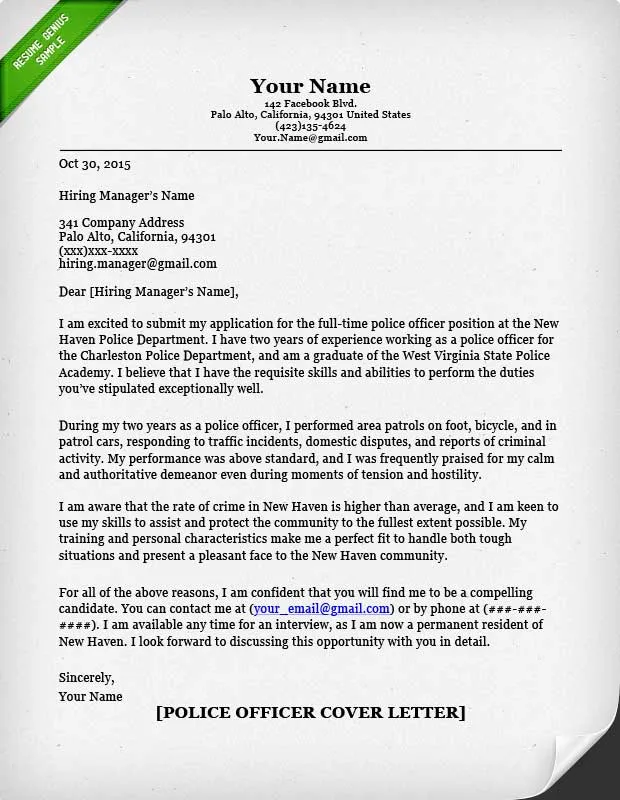
After proofreading and editing, take one final step to review your cover letter from a hiring manager’s perspective. Ask yourself: Does my cover letter clearly state the position I am applying for? Does it highlight my most relevant skills and experiences? Does it demonstrate my genuine interest in the department and the role? Is it tailored to the specific requirements of the job? Does it showcase my personality and passion for law enforcement? Have I used strong action verbs and quantified my achievements? Is it well-formatted and easy to read? Does it contain any errors or inconsistencies? If you can answer ‘yes’ to all these questions, then your cover letter is likely ready to submit. If not, make the necessary revisions before sending it. A well-crafted cover letter is an investment in your future. By taking the time to review and refine your application, you increase your chances of making a strong impression and landing an interview, ultimately leading to your dream job in law enforcement.
